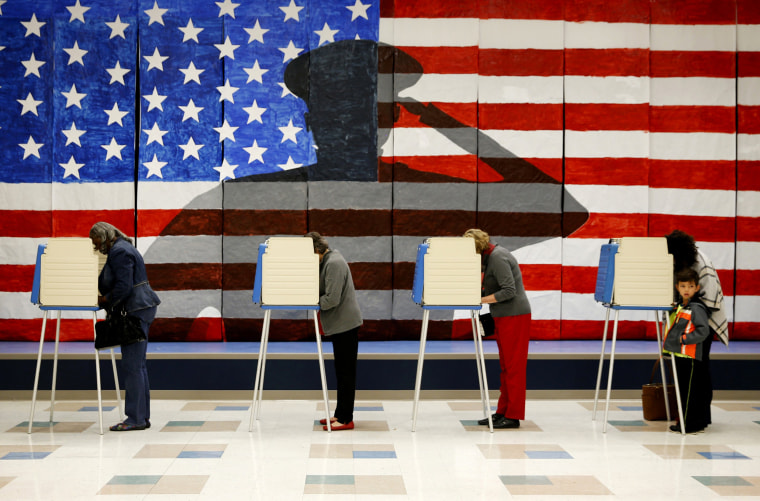Jill Stein was successful in pressuring the Wisconsin Election Commission's Administrator to issue a statement that they would begin a recount of the votes in the election. But rather than helping, Stein’s actions risk damaging the voting rights of Latinos and African-Americans not just in Wisconsin, but in other states, too.
By challenging the election results without any evidence, Jill Stein is giving lawmakers an opportunity to further disenfranchise minorities by passing even more restrictive voter laws that will do nothing to protect people's right to cast their ballots and instead further disenfranchise minorities.
President-Elect Donald Trump responded to Stein's recount request by wildly casting doubt on the very election he won, saying — without any basis for his claim —that millions of votes were cast illegally. Trump later claimed — again, without any proof —that there was electoral fraud in Virginia, California, and New Hampshire.
In California, the response to Trump's claims was swift. Alex Padilla, the first Latino Secretary of State, tweeted: "It appears that Mr. Trump is troubled by the fact that a growing majority of Americans did not vote for him," said Padilla. "His unsubstantiated allegations of voter fraud in California and elsewhere are absurd. His reckless tweets are inappropriate and unbecoming of a President-elect."
While it is important that we improve our voting systems, calling the Wisconsin election into question has opened a Pandora's Box of unfounded allegations that will only give lawmakers an excuse to create more voter laws that will do nothing but make it more difficult for minorities to participate.
Just this year, civil rights lawyers were hard at work fighting unnecessary voter laws in Texas, Wisconsin, and Arizona.
It must be stated that there is zero evidence of tampering or fraud, nor is there any evidence of any systemic attempt to hack the voting machines in Wisconsin. None. This call to action by Jill Stein followed a story in New York magazine that sensationalized a call by a group of computer scientists at the University of Michigan to audit the election based solely on a superficial analysis of differences between paper ballot systems and electronic systems.
Subsequent analysis by Nate Silver at 538 and private data analyst and political scientist Ben Radford found that once other variables are included in the analysis, there was not a likely distinguishable relationship between electronic voting systems and votes for either candidate. In other words, there was no evidence of fraud. So far, nobody has refuted these findings by Silver and Radford with data.
In a blog post by the computer scientist from which the original story was based, Alex Halderman made a case for verifying voting systems in general, and did not say that there was any evidence of fraud in Wisconsin, Michigan, or Pennsylvania.
In his post, Halderman writes, “Examining the physical evidence in these states — even if it finds nothing amiss — will help allay doubt and give voters justified confidence that the results are accurate”.
With the recount now underway, Hillary Clinton has joined in supporting the recount. It should be noted that Marc E. Elias, Hillary Clinton's general counsel, posted on his blog that there is still no evidence of fraud.
"Because we had not uncovered any actionable evidence of hacking or outside attempts to alter the voting technology, we had not planned to exercise this option ourselves," Elias wrote, "but now that a recount has been initiated in Wisconsin, we intend to participate in order to ensure the process proceeds in a manner that is fair to all sides."
Since the controversial election between Bush and Gore in 2000, the government passed several laws meant to bring back confidence in our elections systems, most notably, the Help Americans Vote Act (HAVA). Among other things, HAVA was intended to ensure that there were proper verification procedures in place to prevent voter fraud, as well as mandating that any voter who was being denied the right to vote would be able to file a provisional ballot.
RELATED: Appeals Court OKs Wisconsin's Strict Voter ID Law
However, research has found that the implementation of some of these verification procedures threaten the voting rights of minority groups by making it more difficult for them to acquire the proper voter identification. For instance, in some states a college school ID or a public transportation ID is not allowed to identify the voter. Earlier this year, a federal appeals court found that Texas’ voter ID laws violated the Voting Rights Act, but fell short of saying the law must be struck down.
In recent years Republican lawmakers have justified these voting procedures by saying there is widespread voter fraud, meaning people are impersonating legal voters in order to cast a vote so that they may influence an election.
However, study after study shows there is no evidence that in-person voter impersonation happens in any systemic way. Challenging the electoral process without any evidence only serves to embolden the overwhelmingly Republican-led legislatures passing even more onerous laws making it harder for people, especially minorities, to vote.

